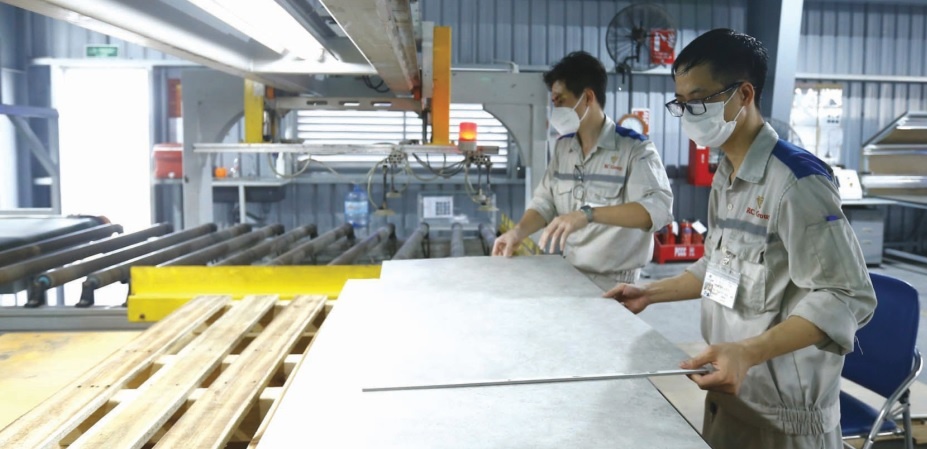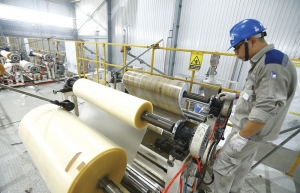SPC flooring ensuring source of raw materials in Vietnam
 |
| Many consumers abroad are keen on Vietnamese-made products, but are wary over proving origin |
The supply chains of American flooring manufacturers are undergoing a reorganisation. Last month, the representative of a US-based manufacturer of premium flooring products said he would travel to Vietnam in November to meet with potential long-term partners.
The representative had contacted Vietgo, an import-export consulting and support firm headquartered in Hanoi. His company deals in a wide variety of products, but stone-polymer composite (SPC) flooring and lock slabs are his primary offerings.
“The company’s current intention is to import flooring from Vietnam. Previously, we imported 10 containers of Chinese flooring per month on a regular basis,” he said. “However, to serve the new business project as well as the desire to expand the variety of products, my company currently wants to try importing flooring products from Vietnam.”
Since June 2022, the implementation of a 25 per cent import tax and the stricter enforcement of the Uyghur Forced Labour Prevention Act (UFLPA) by the US government have had a significant impact on the supply of SPC originating from China.
This context has an impact on Vietnamese SPC manufacturers in both directions: they gain from the slowdown in Chinese SPC imports to the US, but they also face pressure to tighten customs clearance regulations on par with commodities coming from US Customs.
Pressure from the UFLPA was anticipated in Vietnam in advance. IDVN, a Hanoi-based law firm specialising in international trade, cautioned in an early-year report that the UFLPA might expose Vietnamese exporters to risks when shipping to the United States.
IDVN’s managing attorney, Dinh Anh Tuyet, stated that the UFLPA mandates that US importing companies conduct a comprehensive evaluation of supply sources to prevent the importation of Xinjiang-origin products into the US.
“This means that Vietnamese companies are obligated to manage the source of input materials, store documentation, and implement a system for tracing the origin of products. Businesses that fail to fulfil these requirements might forfeit export markets,” Tuyet said.
Facilitating supply chains
A change in conditions has compelled organisations to modify their strategies in order to gain a greater competitive edge. Neo Floor, according to CEO Le Quang, has implemented a number of controls over the provenance of input materials used in the production of SPC plastic floors. As an additional supply control criterion, the organisation demands complete certificates of origin for imported materials.
The retrieval mechanism of Neo Floor commenced testing in August, with a planned official launch date of 2024. In an effort to eradicate forced labour from its supply chain entirely, Neo Floor invested in the development of a product traceability system in accordance with national and international standards two years ago, when the UFLPA was in the drafting stages.
The traceability system ensures interoperability and data exchange with the traceability systems of domestic and international enterprises. This system will facilitate the oversight and investigation of coerced labour within the supply chains of businesses, encompassing not only manufacturers but also direct and secondary suppliers.
For the production of SPC floors, stone granules and polypropylene carbonate (PPC) are the two primary components. Almost no origin-related issues exist for Neo Floor, as it imports more than 70 per cent of its primary PPC from prominent US suppliers and obtains the remainder from domestic plastic manufacturers.
In addition, it possesses two white stone mines in the provinces of Yen Bai and Nghe An, each with reserves of up to five million cu.m, ensuring that member enterprises have access to sufficient raw materials annually to manufacture 25-30 million sq.m of SPC flooring.
Neo Floor can concentrate on large-scale production, develop intelligent access systems, forge alliances, and arrange resources to satisfy market demands due to its long-term perspective. Presently, the company is engaged in the implementation of development strategies for the 2021-2025, encompassing innovation in construction materials based on technology.
Surpassing expectations
However, the company has invested heavily in the production of SPC flooring products since before 2020, with exports to the US market comprising over 90 per cent of total output. Consequently, the technical and legal prerequisites for exporting to the US have been fulfilled as well, including acquiring GreenGuard Gold certifications and acquiring the copyright for Unilin’s locking technology from the US’ Mohawk Group.
Transparency in the manufacturing process and privileges in raw materials will help Neo Floor compete better and boost exports to the US market, said Quang of Neo Floor. “SPC is a relatively new building material that has only been available on the global market for the past five years. Its impermeable and termite-resistant properties, resistance to shrinkage caused by temperature fluctuations, and ability to maintain the integrity of the floor surface are what attract users,” Quang explained.
According to the company, this material has captured half of the flooring market share in the US, which is an increase rate that surpasses the wildest projections of material distributors.
Despite investing later in SPC flooring production compared to other US-exporting countries, Vietnam entered the market rapidly on account of the variety and quality of its product lines. As per Quang’s assertion, plastic flooring products are consistently gaining user interest due to their evolving structures.
First-generation luxury vinyl plank flooring is appropriate for hospitals and schools, among other public structures, while wood-plastic SPC flooring of the second generation is water-resistant and straightforward to install due to the product thickness. Nonetheless, this product line’s price advantage is minimal.
SPC flooring, the third generation, exceeds expectations in terms of quality, design, and cost, in addition to satisfying technical and environmental standards that are imported into the US.
Many American consumers, according to Quang, feel more secure when purchasing Vietnamese-made goods. However, there are additional purchasers who are apprehensive about the “faking origin” situation in Vietnam in order to export goods to the US, given that Vietnam is home to 10 of the largest SPC manufacturers in China.
“They have an expectation that manufacturers furnish them with digitised documents, as the provision of paper documents would impede usability and storage,” Quang said. “When employing conventional business practices, an SPC floor container necessitates an estimated 150 data documents. We desire to show our capacity to work hand in hand with our partners and our responsibility to the end consumer.”
The proactive implementation of a traceability system by Neo Floor is beneficial for both manufacturers and purchasers. Concurrently, it generates sufficient evidence of origin to support third parties, including export markets, Vietnamese state management agencies, and US Customs.
| The aggregate worth of SPC exports from Vietnam to America in 2021 amounted to $784 million, representing 14 per cent of the value consumed in the US. The volume of exported goods reached 84 million sq.m, which is 19.2 per cent of US consumption. The aggregate worth in 2022 amounted to $939 million, representing 17 per cent, while the export volume reached 125 million sq.m, or 28.7 per cent of US consumption.Source: Neo Floor market analysis |
 | SPC exports to US at risk due to questions on origin claims The Vietnamese producers of construction materials believe that while the danger of false origin is currently low, they must still take precautions. |
 | Substantial funding backs up SPC flooring opportunities Imports of stone-polymer composite (SPC) flooring into the US market has declined, creating an opportunity for non-Chinese manufacturers like Neo Floor. VIR ‘s Van Nguyen discussed this with Neo Floor CEO Le Quang. |
What the stars mean:
★ Poor ★ ★ Promising ★★★ Good ★★★★ Very good ★★★★★ Exceptional
Related Contents
Latest News
More News
- Masan Consumer names new deputy CEO to drive foods and beverages growth (February 23, 2026 | 20:52)
- Myriad risks ahead, but ones Vietnam can confront (February 20, 2026 | 15:02)
- Vietnam making the leap into AI and semiconductors (February 20, 2026 | 09:37)
- Funding must be activated for semiconductor success (February 20, 2026 | 09:20)
- Resilience as new benchmark for smarter infrastructure (February 19, 2026 | 20:35)
- A golden time to shine within ASEAN (February 19, 2026 | 20:22)
- Vietnam’s pivotal year for advancing sustainability (February 19, 2026 | 08:44)
- Strengthening the core role of industry and trade (February 19, 2026 | 08:35)
- Future orientations for healthcare improvements (February 19, 2026 | 08:29)
- Infrastructure orientations suitable for a new chapter (February 19, 2026 | 08:15)

 Tag:
Tag:


















 Mobile Version
Mobile Version